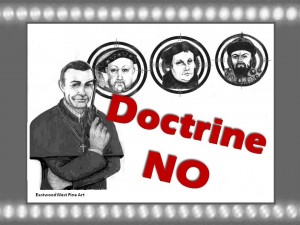A Promising Young Man
Posted in General, On This Day on September 30th, 2009 by Eugene Finerman – Be the first to commentSeptember 30, 1399: Henry of Bolingbroke Gets a Job
Henry of Bolingbroke (1367-1413) had been frustrated. First, he had the worst title in the royal family. The other Plantagenets had more distinguished identifications like Lancaster, York or Cambridge. Bolingbroke sounded like a skin condition. Worse, Henry had nothing to occupy him. Keeping his rich wife in a continual state of pregnancy was at most fifteen minutes’ activity a year. War was the family business but France and England were at peace. Apparently the French had won the Fifty-Two Year War, and King Richard II did not want to round it off to the nearest hundred. Henry was not even free to indulge in vices. If he had tried womanizing, people would have said that he was competing with his father (John of Gaunt, the Plantagenet stud muffin). Bolingbroke did not possess the blithering smugness to be an upper class twit; besides, the King was setting was standard for that.
So in 1390 Henry decided to travel. (His wife Mary stayed home, gestating her fourth duke.) Bolingbroke might have gone to Italy where the artists were experimenting with a remarkable innovation called perspective. (Actually the Romans used it but there had a 900-year-long memory lapse.) But he preferred to go to Lithuania where he joined in the local crusade. The Lithuanians were the last remaining pagans in Europe, so any pious Catholic was free to slaughter them. With a Papal blessing, German knights had conquered and forcibly converted the territories we’d recognize (vaguely) as Estonia and Latvia; but the Lithuanians successfully resisted two centuries of crusades. Henry’s assistance to the Teutonic Knights did not turn the tide of battle but he survived unscathed, and he probably was relieved that any word in German sounds worse than Bolingbroke. The following year he returned to England and another impregnation. One daughter later he was off to Cyprus and Jerusalem, returning in 1493 and the ensuing pregnancy finally killed his poor wife. The widower felt obliged to stay on the same island as his six children.
He now took up the family’s other business: politics. Richard II had proved an appalling king; he had the rare distinction of being both unethical and incompetent. Anyone could have done a better job and every one of the Plantagenets was trying. No one was actually planning to overthrow Richard, just relegate him to a powerless figurehead. The two chief contenders to be the royal ventriloquist were the king’s uncles: Thomas of Woodstock and John of Gaunt. However, Richard did not appreciate their concern. In 1397, he had Uncle Thomas imprisoned, where he promptly died. Uncle John avoided the king’s tantrums, but cousin Henry was not so adroit. For questioning the case of his uncle’s death, Bolingbroke was exiled from England for ten years.
John of Gaunt died–without help–in February, 1399. Henry of Bolingbroke should have inherited his father’s titles and estates; the terms of his exile had not barred him from the succession. However, contrary to the laws and basic decency, Richard confiscated the entire estate. As King, he might commit a crime; but Richard was not strong enough to get away with it. He commanded little loyalty. The progressive nobles despised his blundering misrule. The conservative lords loathed his personal conduct; Richard was a bit too poetic and he practiced hygiene before it was fashionable. (The next generation of Plantagenets was not springing from his loins.) So, in July 1399, when Bolingbroke returned to England it was to popular acclaim and armed support.
Bolingbroke justified his rebellion, claiming that he was only interested in the restoration of his father’s estate. But he was making promises and alliances that indicated that he expected more than just the Duchy of Lancaster. Richard buckled and capitulated; whether he made some superb speeches, you only have Shakespeare’s word for it. Paraded as a prisoner on the way to London, Richard was “persuaded” to abdicate. As of September 29, 1399: England had no king. The following day, Parliament offered the Crown to Bolingbroke. The wily Henry may have even acted surprise. He now was Henry IV of England and (an unwilling) Wales.
Richard was dead within a year; someone forgot to feed him. And Henry found that “uneasy lies the head that wears a crown.” Usurpation can set a tempting precedence. The Plantagenets were a large and underemployed family. All of Henry’s cousins tried to wrest the throne for themselves; they did not succeed–at least for another two generations–but the intrigues and struggles would last 85 years and 8 plays.

